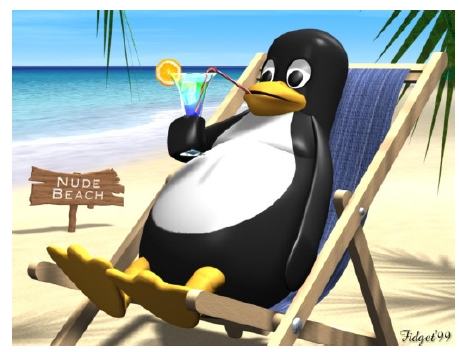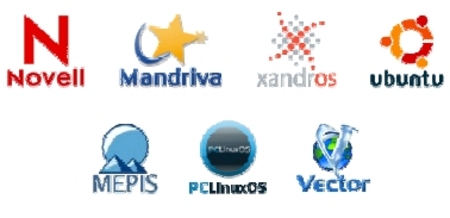Hvilken Linux? En rejse i frihedens uvejsomme bjerge

Nu har jeg efterhånden mange gange gjort opmærksom på, at Linux (eller, mere korrekt men også mere omstændeligt, GNU/Linux) er et operativsystem, som der er mange fordele ved at installere på sin computer - herunder, at det er fri software, som man til hver en tid kan installere, geninstallere og downloade ny software til uden at skulle hverken betale, registreres eller udsætte sig selv for reklamer.
Men, har nogen sikkert spurgt sig selv - hvordan virker det egentlig? Er det til at finde ud af at installere og bruge for en ganske almindelig bruger uden højere teknisk eksamen?
Og så er "Linux", hvad man ret hurtigt opdager, hvis man giver sig til at lede efter oplysninger om det, temmelig mange forskellige ting. Det fås i hundrede- eller tusindvis af varianter eller "distributioner", som adskiller sig fra hinanden på mere eller mindre uigennemskuelig vis. Hvor skal man starte, hvis man bare gerne vil have sin PC til at virke, så man kan få lavet sit arbejde?
Den australske konsulent Kim Brebach har besvaret dette spørgsmål i en humoristisk artikelserie om den ensomme vandrer, der har hørt at frihedens vinde blæser i Mozillas bjerge, og at der er en hel verden at opdage for den, der ikke lader sig skræmme af det underlige sprog, der hviskes i områdets landsbyer.
Og den inkarnerede men utilfredse Windows-bruger Brebach fandt, at selvom der er mange farer, der lurer på den uindviede, er det faktisk muligt at finde ly i en verden, hvor man er fri til at vælge og langt fra kong William af Redmonds tyranniske hof.
Brebach beskriver med andre ord sine erfaringer med en lang række Linux-distributioner, vurderet efter hvor let han som helt nybegynder kan installere skidtet og komme igang med at bruge sin computer.
Brebach konkluderer bl.a., helt i artikelseriens ånd:
Maybe the mountain air made me light-headed or perhaps it was the special brew they serve in the taverns, or the buzz of excitement in the villages. Whatever it was, I came away convinced that some of their weapons were ready for battle with the kingdom. Sadly, Weapons are not enough. The King has a vast army of mercenaries, while the rebels rely on bands of volunteers from the mountain villages. The best they can hope for is to take a few guard posts at the outer margins of the kingdom.Eller, som Brebach også formulerer det andetsteds:
Of course they say they don't want war with the kingdom but merely reclaim some of their lost territories and attract more settlers. That is possible, given that the aging King is preoccupied with the upstarts from Google who have a war chest that seems to rival his own, and with the Apple growers who're beating at the gates again. To add to the King's woes, some PC makers have decided to offer XP as an alternative to Vista because many of their customers baulk at the tax the King has placed on Vista.
Stealth is the best strategy for the rebels. They got their servers into many businesses who value lower cost, greater flexibility and better security. The same businesses will be drawn to Linux desktops for the same reasons. Employees will learn about Linux at work, as they did two decades ago about Windows. They'll take their knowledge home and then they'll think about buying Linux PCs for their own use.
But the early adopters will be people like you and me who find the kingdom a stale place.
In the end, it's not about which is a better place to live, but which has the fresher air and more freedom of choice. Too much choice may be confusing, but it's a whole lot better than none at all.
There's an old joke that begins like this: What if operating systems were airlines?
- Windows Airlines -- The terminal is pretty and colorful, with friendly stewards, easy baggage check and boarding, and a smooth take-off. After about 10 minutes in the air, the plane explodes with no warning whatsoever.
- Mac Airlines -- All the stewards, stewardesses, captains, baggage handlers and ticket agents look the same, act the same, and talk the same. Every time you ask questions about details, you are told you don't need to know, don't want to know, and would you please return to your seat and watch the movie.
- Linux Airlines -- Disgruntled employees of all the other OS airlines decide to start their own airline. They build the planes, ticket counters, and pave the runways themselves. They charge a small fee to cover the cost of printing the ticket, but you can also download and print the ticket yourself. When you board the plane, you are given a seat, four bolts, a wrench and a copy of the seat-HOWTO.html. Once settled, the fully adjustable seat is very comfortable, the plane leaves and arrives on time without a single problem, the in-flight meal is wonderful. You try to tell customers of the other airlines about the great trip, but all they can say is, 'You had to do what with the seat?'

Link til Brebachs artikelserie om Linux for almindelige brugere.
